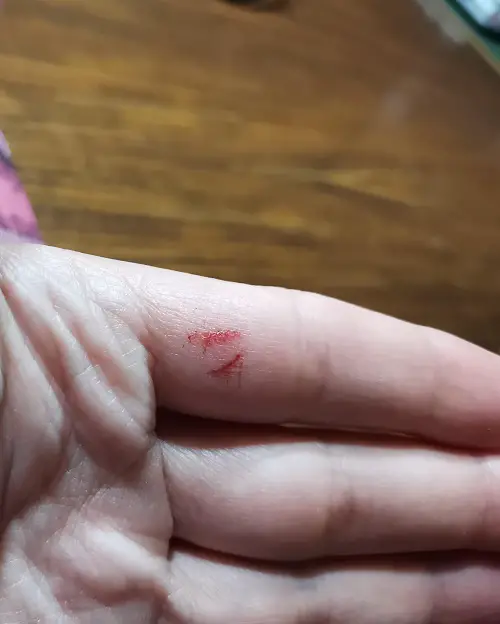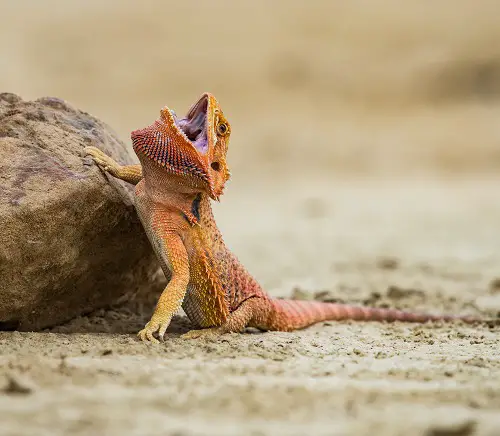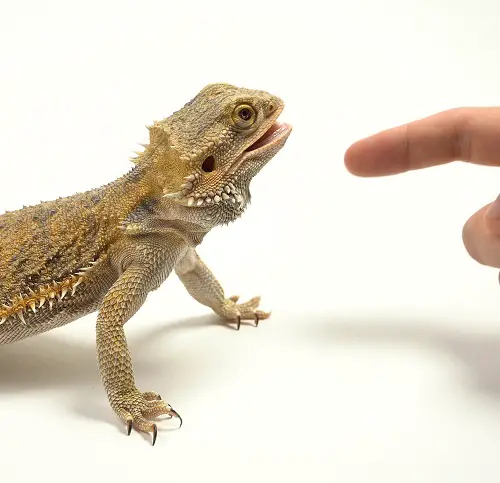Do Bearded Dragons Bite? If you, too, are concerned and have this question in your mind, then we have all the answers!

Do Bearded Dragons Bite? You might have had this question flash many times in your mind if you have one as a pet. So, what’s the answer? Time to find out the truth!
Do Bearded Dragons Bite?

Bearded dragons, renowned for their striking appearance and obedience, may occasionally exhibit biting behavior. Bearded dragons do not typically bite, contrary to popular belief. They typically only bite when they are in fear, under stress, or feel threatened.
Types of Bites
- A mild warning bite will make the dragon feel threatened or uncomfortable.
- A defensive bite is more intense and is usually meant to protect the dragon from a perceived threat. A bearded dragon may bite if it feels cornered or has no other way to escape.
- An accidental bite can happen when the bearded dragon feeds or handles something and mistakes it for something else.
Understanding how bearded dragons bite can help you take better care of them, keep them calm, and reduce the chances of them biting you.
What Causes Bearded Dragons to Bite?
- Common triggers include being approached too quickly, mishandling, unfamiliar surroundings, and improper handling.
- Bearded dragons are cautious creatures, so being approached too quickly or aggressively can cause them to defend themselves by biting.
- Mishandling can cause discomfort and fear, leading them to bite to protect themselves. To avoid a bite, it is important to follow the following guidelines.
When interacting with a bearded dragon, it is important to approach them in a calm and orderly manner, avoiding sudden movements. This will help to reduce stress and reduce the likelihood of aggressive behavior.
Recognizing Stress Indicators
- It is important to be aware of the signs of stress that may be present in a bearded dragon, as they can be a warning sign before the animal resorts to biting.
- These signs include darkening the bearded dragon’s beard, puffing up, and hissing.
- By being aware of these signs, it is possible to understand the dragon’s temperament better and take the necessary steps to calm it down.
Additionally, gentle and steady movements should be used when picking up or holding the dragon, avoiding squeezing or restraining. To further reduce the risk of bites, creating an environment in the enclosure that mimics the dragon’s natural habitat, with the appropriate temperature, lighting, and hiding spots, is recommended.
Something Essential
Focus on Socialization! If you’re bringing a young bearded dragon into your home, socialization is one of the most important things you can do to prevent them from biting in the future. Gentle handling from an early age will help your bearded dragon get used to humans and help them avoid biting as they grow older.
What to Do if Your Bearded Dragon Bites You?
- Stay calm, and don’t move or panic.
- Take the dragon’s jaws out of your skin gently and slowly.
- Don’t pull or yank, as this could cause more damage.
- Clean the wound immediately with soap and water to prevent infection. Then, figure out why the dragon bit you.
Health Risks from Bites
Bearded dragons are usually considered low-risk pets, but they can still carry germs like salmonella, so if you get bit, clean the wound and get medical help immediately. Immediate treatment can help reduce the risk of bacterial infection.
Can Bearded Dragon Eat Cantaloupe? Find Out!
Other Considerations for Bearded Dragon Owners
When caring for a bearded dragon, it is important to be aware of more than just their biting behavior. Be mindful of other potential behaviors, such as aggression, lethargy, and activity level. To ensure the health and well-being of your pet, focus on the following critical aspects of care:
- Provide a varied diet that includes insects, vegetables, and fruits. Research what your bearded dragon needs and consult a reptile vet for dietary advice.
- Create a suitable habitat that is similar to their natural habitat. Provide adequate heat, UV-B light, hiding places, and a suitable substrate for scratching.
- Visit a reptile vet regularly for health check-ups, parasite check-ups, and vaccines (if needed).
- Bearded dragons may not be as friendly as other pets, but they must be around humans. Handle them gently and provide environmental enrichment to help them learn and grow.
FAQs
1. Why do bearded dragons puff up their beard?
Bearded dragons puff up their beard to show they’re scared or feeling threatened. It’s like them saying, “I’m not happy; stay away!”
2. Can bearded dragons change their color?
Yes, bearded dragons can change color! They might get darker when they’re stressed or lighter when they’re calm and happy.
3. What should I do if my bearded dragon bites me?
If your bearded dragon bites you, stay calm and gently remove its jaws from your skin. Clean the wound with soap and water to prevent infection.
4. Can a bearded dragon bite cause serious harm?
Bearded dragon bites are usually not serious, but they can break the skin. While they’re low-risk pets, it’s essential to handle them carefully to avoid bites and keep both you and your pet safe.
5. Do bearded dragons like to be petted?
Some bearded dragons enjoy gentle pets, but not all of them do. It depends on their personality. Always be gentle and watch for signs they don’t like it.
Bearded dragons don’t usually bite their owners, but if you take good care of them, they can be a great addition to any home. They’re easy to take care of and don’t require much maintenance, so if you pay attention to their behavior and what triggers them to bite, you can have a great relationship with them.




